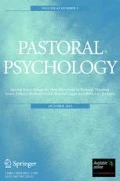Abstract
In Pastoral Counseling: The Basics (1999a) it is not the “what” or “how” of pastoral counseling that is most important. Fundamentally it is a question of identity: who—and whose—are you when you are a pastoral counselor? James Dittes answers the question of the “who” by his description of the role of the pastoral counselor as ascetic witness. This role requires the stringent discipline of self-renunciation and a surrendering of the ego. Not problem-solving, but attention to feelings, unconditional regard, and a gracious nonchalance are some of the marks of the counselor as ascetic witness.
Similar content being viewed by others
References
Dittes, J. E. (1999a). Pastoral counseling: the basics. Louisville, Kentucky: Westminster John Knox Press.
Dittes, J. E. (1999b). Re-calling ministry. D. Capps (Ed.). St. Louis: Chalice Press.
Dittes, J. E. (1996). Men at work. Louisville: Westminster John Knox Press.
Dittes, J. E. (1996b). Driven by hope: Men and meaning. Louisville: Westminster John Knox Press.
Gill, B. L. (1985). “A ministry of presence.” In J.L. Weidman (Ed.). Women ministers: How women are redefining traditional roles (pp. 89–106). San Francisco: Harper and Row Publishers.
Hillman, J. (1967). Insearch. New York: Charles Scribners' Sons.
Jordan, J. et al. (1991). Women's growth in connection: Writings from the Stone Center. New York: Guilford Press.
Kornfeld, M. (2000). Cultivating wholeness: A guide to care and counseling in faith communities. New York: Continuum.
Neuger, C. (2001). Counseling women: A narrative pastoral approach. Minneapolis, Minnesota: Fortress Press.
Rogers, C. R. (1961). On becoming a person. Boston: Houghton Mifflin Company.
Sullivan, H. S. (1953). The interpersonal theory of psychiatry. New York: W. W. Norton.
Author information
Authors and Affiliations
Rights and permissions
About this article
Cite this article
Gill-Austern, B.L. Pastoral Counseling: The Art of Ascetic Witnessing. Pastoral Psychology 52, 81–96 (2003). https://doi.org/10.1023/A:1026058213342
Issue Date:
DOI: https://doi.org/10.1023/A:1026058213342



